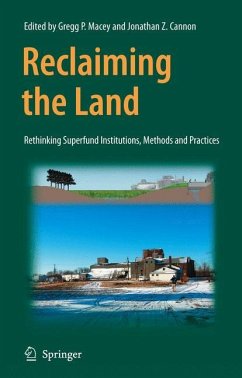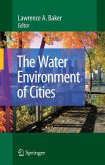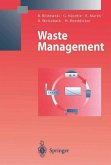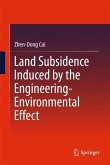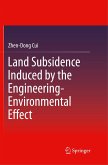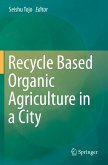Reclaiming the Land
Rethinking Superfund Institutions, Methods and Practices
Herausgegeben:Macey, Gregg; Cannon, Jonathan Z.
Reclaiming the Land
Rethinking Superfund Institutions, Methods and Practices
Herausgegeben:Macey, Gregg; Cannon, Jonathan Z.
- Broschiertes Buch
- Merkliste
- Auf die Merkliste
- Bewerten Bewerten
- Teilen
- Produkt teilen
- Produkterinnerung
- Produkterinnerung
Nearly thirty years after creation of the most advanced and expensive hazardous waste cleanup infrastructure in the world, this book provides a much-needed lens through which the Superfund program should be assessed and reshaped. Focusing on the lessons of adaptive management, it explores new concepts and tools for the cleanup and reuse of contaminated sites, and for dealing with the uncertainty inherent in long-term site stewardship.
Andere Kunden interessierten sich auch für
![The Water Environment of Cities The Water Environment of Cities]() The Water Environment of Cities110,99 €
The Water Environment of Cities110,99 €![Waste Management Waste Management]() Bernd BilitewskiWaste Management117,69 €
Bernd BilitewskiWaste Management117,69 €![Land Subsidence Induced by the Engineering-Environmental Effect Land Subsidence Induced by the Engineering-Environmental Effect]() Zhen-Dong CuiLand Subsidence Induced by the Engineering-Environmental Effect74,99 €
Zhen-Dong CuiLand Subsidence Induced by the Engineering-Environmental Effect74,99 €![Environmental History of the Rhine-Meuse Delta Environmental History of the Rhine-Meuse Delta]() P.H. NienhuisEnvironmental History of the Rhine-Meuse Delta147,99 €
P.H. NienhuisEnvironmental History of the Rhine-Meuse Delta147,99 €![Land Subsidence Induced by the Engineering-Environmental Effect Land Subsidence Induced by the Engineering-Environmental Effect]() Zhen-Dong CuiLand Subsidence Induced by the Engineering-Environmental Effect74,99 €
Zhen-Dong CuiLand Subsidence Induced by the Engineering-Environmental Effect74,99 €![The Effects of Air Pollution on Cultural Heritage The Effects of Air Pollution on Cultural Heritage]() The Effects of Air Pollution on Cultural Heritage116,99 €
The Effects of Air Pollution on Cultural Heritage116,99 €![Recycle Based Organic Agriculture in a City Recycle Based Organic Agriculture in a City]() Recycle Based Organic Agriculture in a City66,99 €
Recycle Based Organic Agriculture in a City66,99 €-
-
-
Nearly thirty years after creation of the most advanced and expensive hazardous waste cleanup infrastructure in the world, this book provides a much-needed lens through which the Superfund program should be assessed and reshaped. Focusing on the lessons of adaptive management, it explores new concepts and tools for the cleanup and reuse of contaminated sites, and for dealing with the uncertainty inherent in long-term site stewardship.
Produktdetails
- Produktdetails
- Verlag: Springer / Springer US / Springer, Berlin
- Artikelnr. des Verlages: 978-1-4419-4311-8
- Softcover reprint of hardcover 1st ed. 2007
- Seitenzahl: 324
- Erscheinungstermin: 18. Oktober 2010
- Englisch
- Abmessung: 235mm x 155mm x 18mm
- Gewicht: 492g
- ISBN-13: 9781441943118
- ISBN-10: 1441943110
- Artikelnr.: 32135435
- Verlag: Springer / Springer US / Springer, Berlin
- Artikelnr. des Verlages: 978-1-4419-4311-8
- Softcover reprint of hardcover 1st ed. 2007
- Seitenzahl: 324
- Erscheinungstermin: 18. Oktober 2010
- Englisch
- Abmessung: 235mm x 155mm x 18mm
- Gewicht: 492g
- ISBN-13: 9781441943118
- ISBN-10: 1441943110
- Artikelnr.: 32135435
Gregg Macey is a Lecturer in the Department of Urban and Environmental Planning at the University of Virginia, where he has taught environmental economics, land use law and policy, and environmental justice. He is also an attorney with the law firm Kirkland & Ellis. He holds a J.D. from the University of Virginia and will receive his Ph.D. in urban planning from MIT. Prior to law school, he worked as a land use mediator and a consultant. Jonathan Cannon is Professor and Director of the Environmental and Land Use Law Program at the University of Virginia Law School. He was formerly in the private practice of environmental law and also served in a number of senior positions at the U.S. Environmental Protection Agency, including most recently General Counsel. He was Director of the Center for Expertise for Superfund Site Recycling at the University of Virginia.
Introduction: The Promises and Pitfalls of Adaptive Site Stewardship Gregg P. Macey 1. Overview of the Superfund Program Alexander E. Farrell 2. Adaptive Management in Superfund: Thinking Like a Contaminated Site Jonathan Z. Cannon 3. Adaptive Management: A Review and Framework for Integration with Multi-Criteria Decision Analysis F. Kyle Satterstrom, Igor Linkov, Gregory Kiker, Todd Bridges, and Marc Greenberg 4. Systems Analysis and Adaptive Learning for Portfolio Management of Superfund Sites Peter A. Beling, James H. Lambert, Faheem A. Rahman, George O. Overstreet, and David Slutzky 5. A Cost-Benefit Model for Evaluating Remediation Alternatives at Superfund Sites Incorporating the Value of Ecosystem Services Melissa Kenney and Mark White 6. Institutional Controls at Brownfields: Real Estate and Land Use, Not Just RCRA and Superfund Jennifer L. Hernandez and Peter W. Landreth 7. Rethinking Community Involvement for Superfund Site Reuse: The Case for Consensus-Building in Adaptive Management E. Franklin Dukes 8. Toxic Sites as Places of Culture and Memory: Adaptive Management for Citizenship Daniel Bluestone 9. CHAT: Approaches to Long-Term Planning for the Tar Creek Superfund Site, Ottawa County, Oklahoma Niall G. Kirkwood Conclusion Gregg P. Macey and Jonathan Z. Cannon
Introduction: The Promises and Pitfalls of Adaptive Site Stewardship Gregg P. Macey 1. Overview of the Superfund Program Alexander E. Farrell 2. Adaptive Management in Superfund: Thinking Like a Contaminated Site Jonathan Z. Cannon 3. Adaptive Management: A Review and Framework for Integration with Multi-Criteria Decision Analysis F. Kyle Satterstrom, Igor Linkov, Gregory Kiker, Todd Bridges, and Marc Greenberg 4. Systems Analysis and Adaptive Learning for Portfolio Management of Superfund Sites Peter A. Beling, James H. Lambert, Faheem A. Rahman, George O. Overstreet, and David Slutzky 5. A Cost-Benefit Model for Evaluating Remediation Alternatives at Superfund Sites Incorporating the Value of Ecosystem Services Melissa Kenney and Mark White 6. Institutional Controls at Brownfields: Real Estate and Land Use, Not Just RCRA and Superfund Jennifer L. Hernandez and Peter W. Landreth 7. Rethinking Community Involvement for Superfund Site Reuse: The Case for Consensus-Building in Adaptive Management E. Franklin Dukes 8. Toxic Sites as Places of Culture and Memory: Adaptive Management for Citizenship Daniel Bluestone 9. CHAT: Approaches to Long-Term Planning for the Tar Creek Superfund Site, Ottawa County, Oklahoma Niall G. Kirkwood Conclusion Gregg P. Macey and Jonathan Z. Cannon

